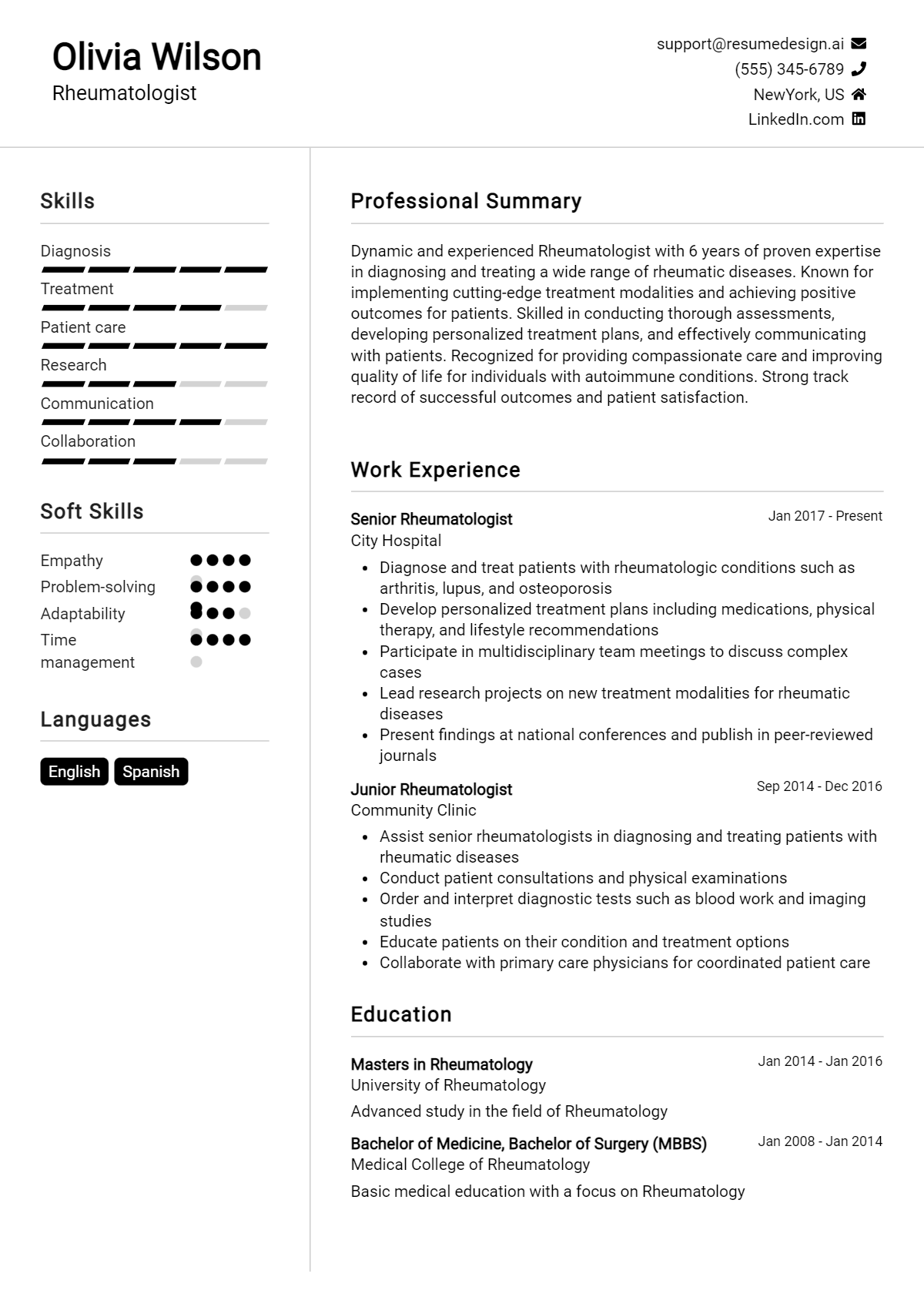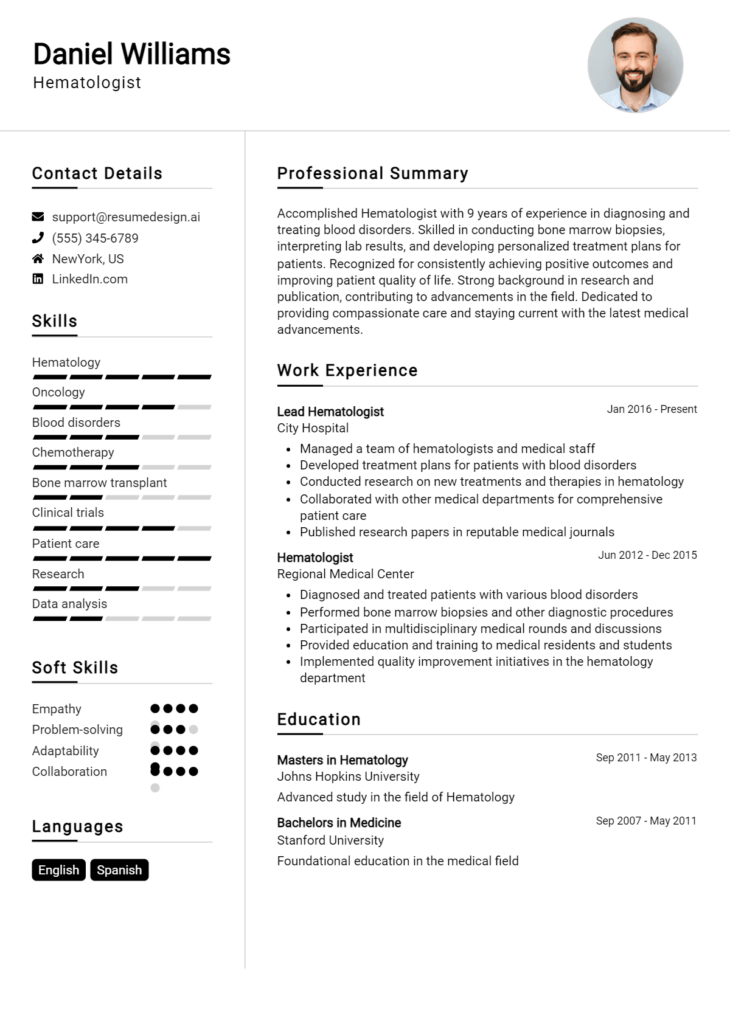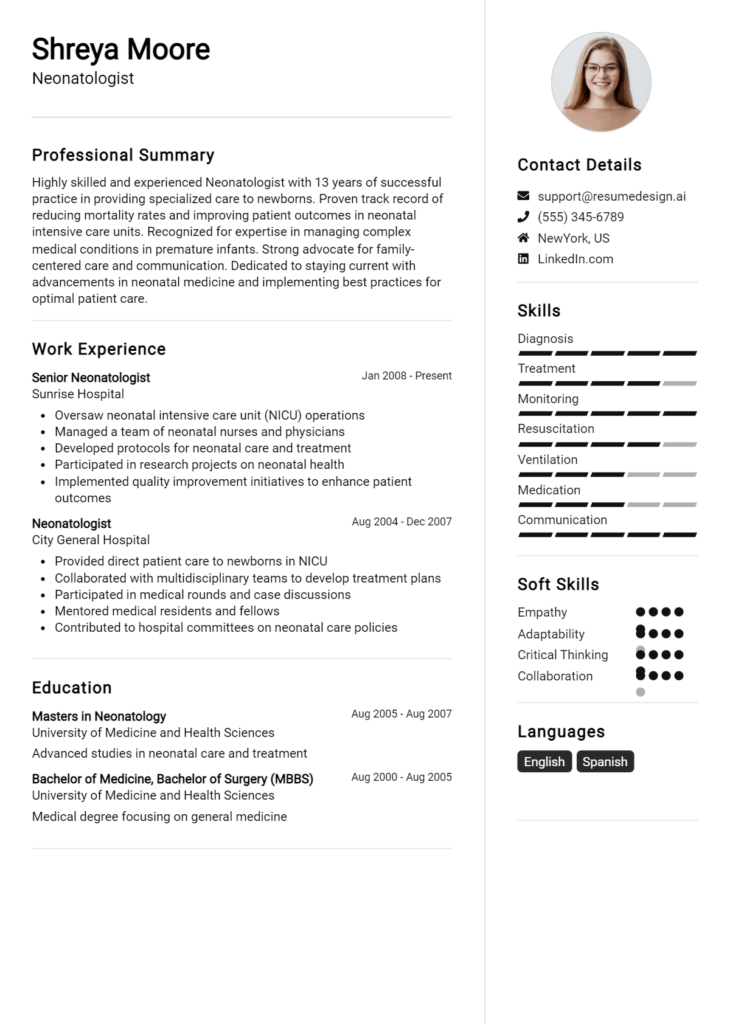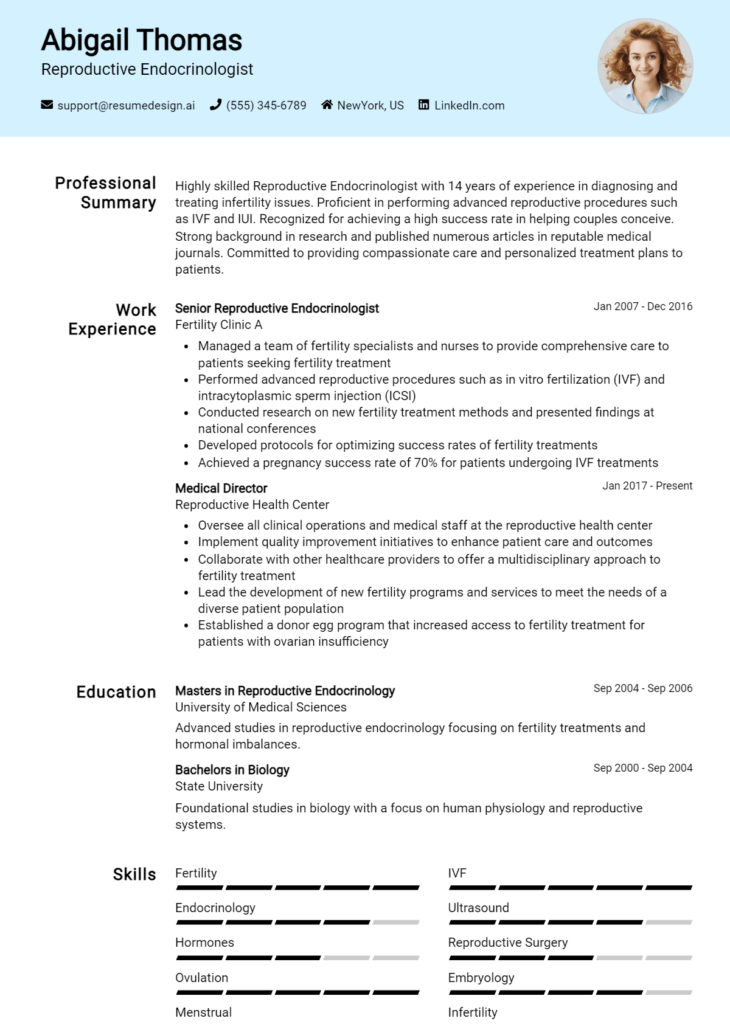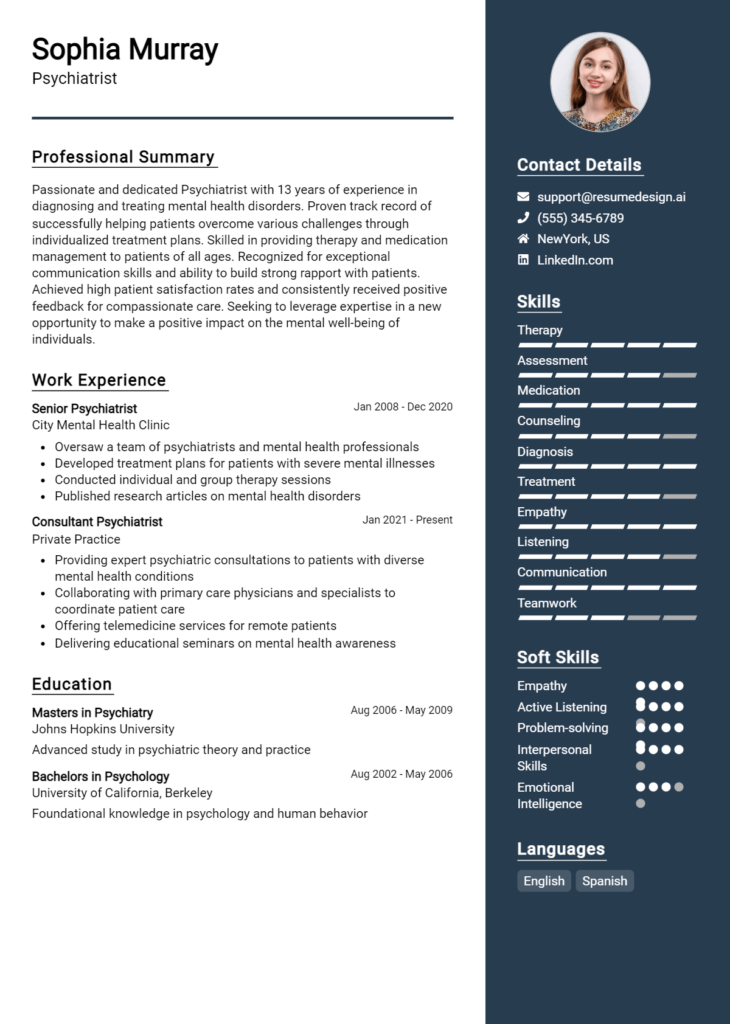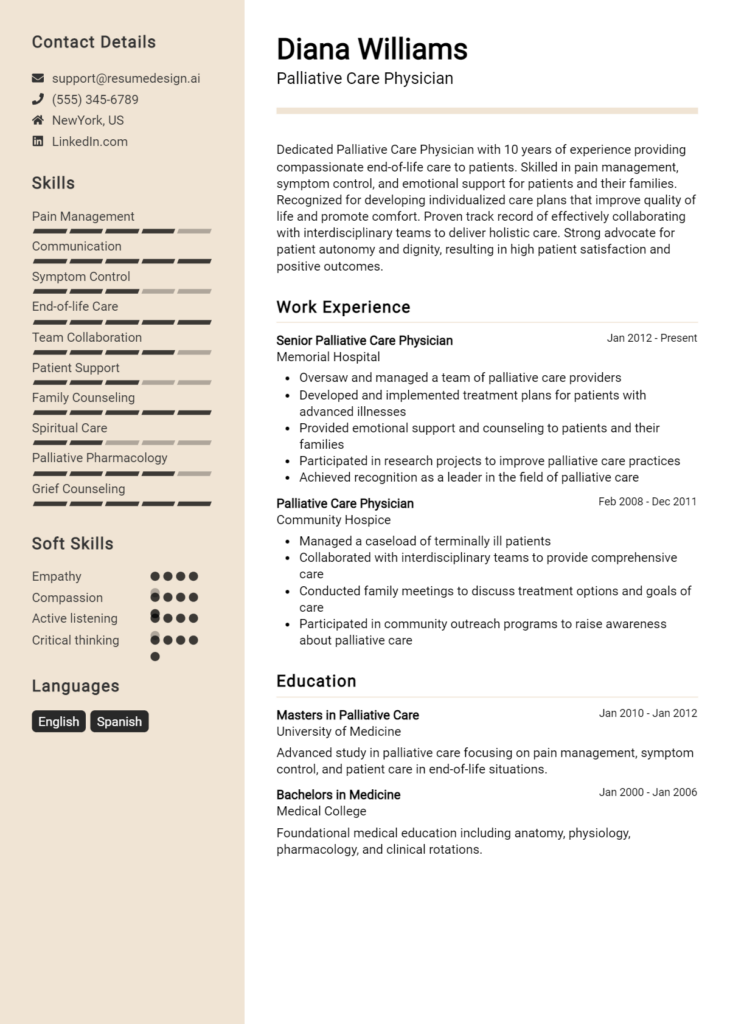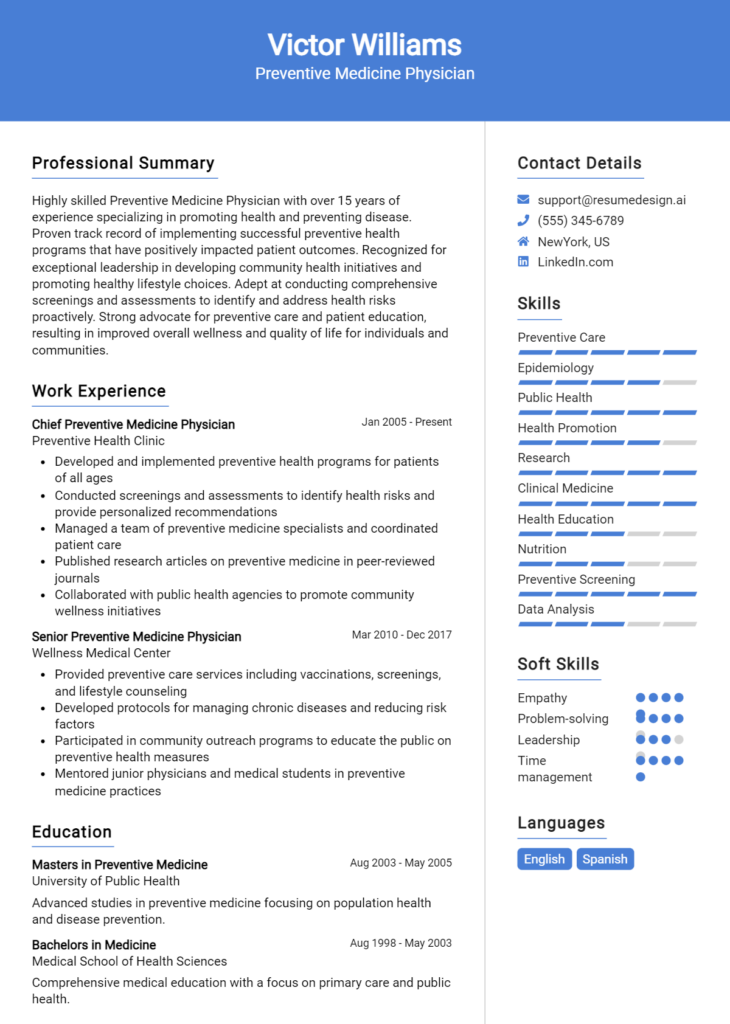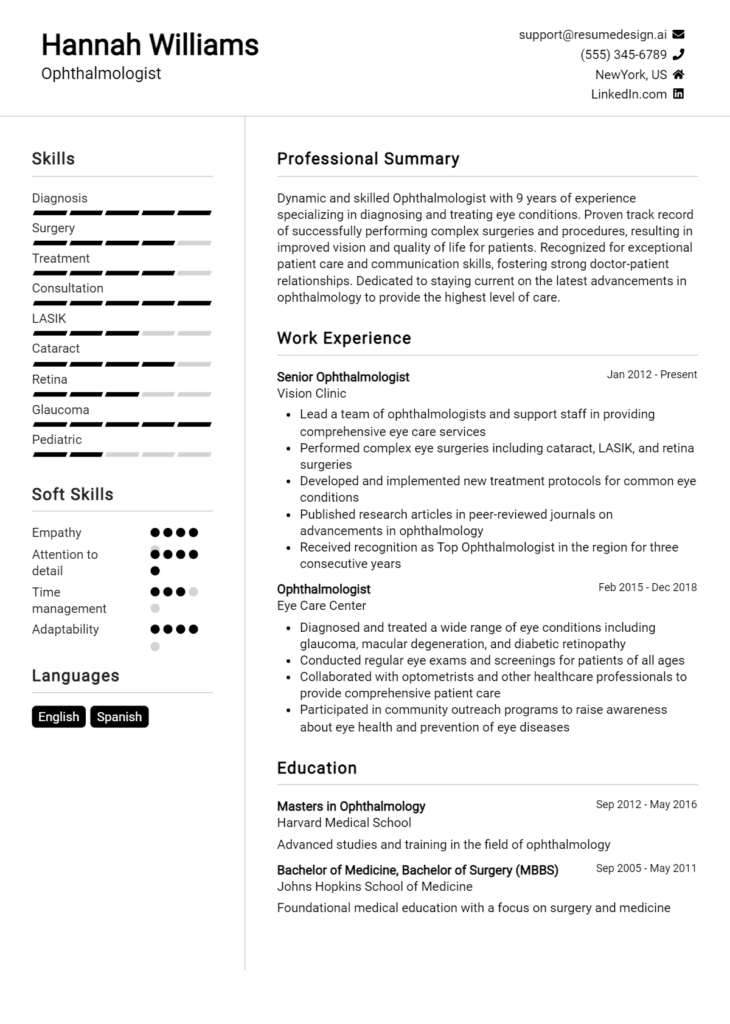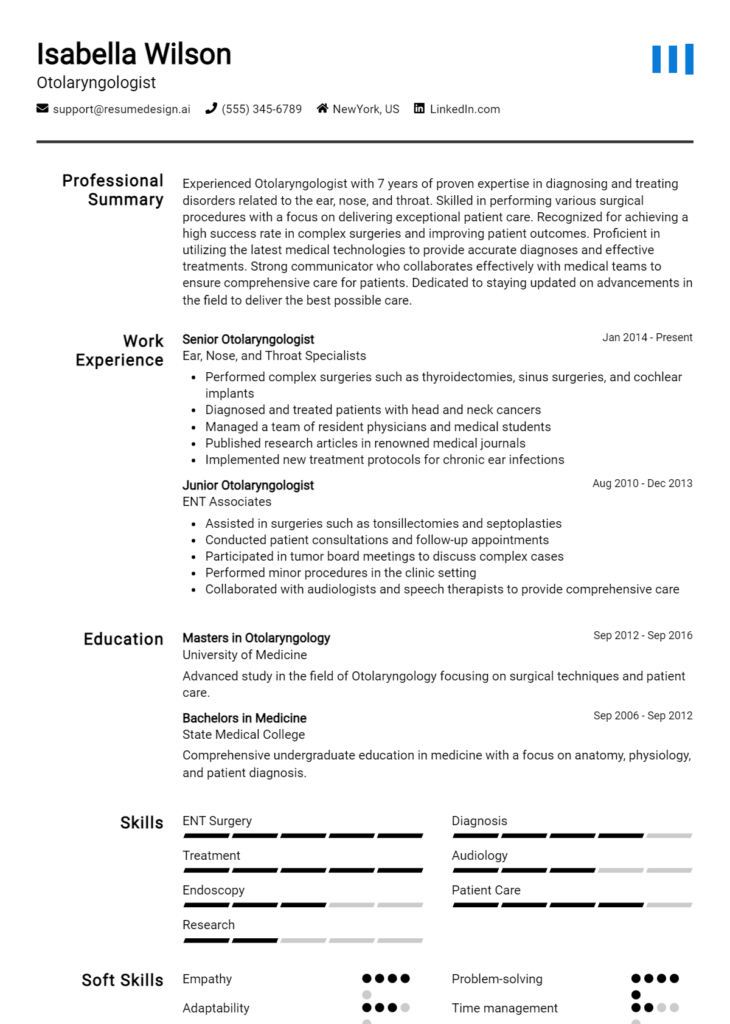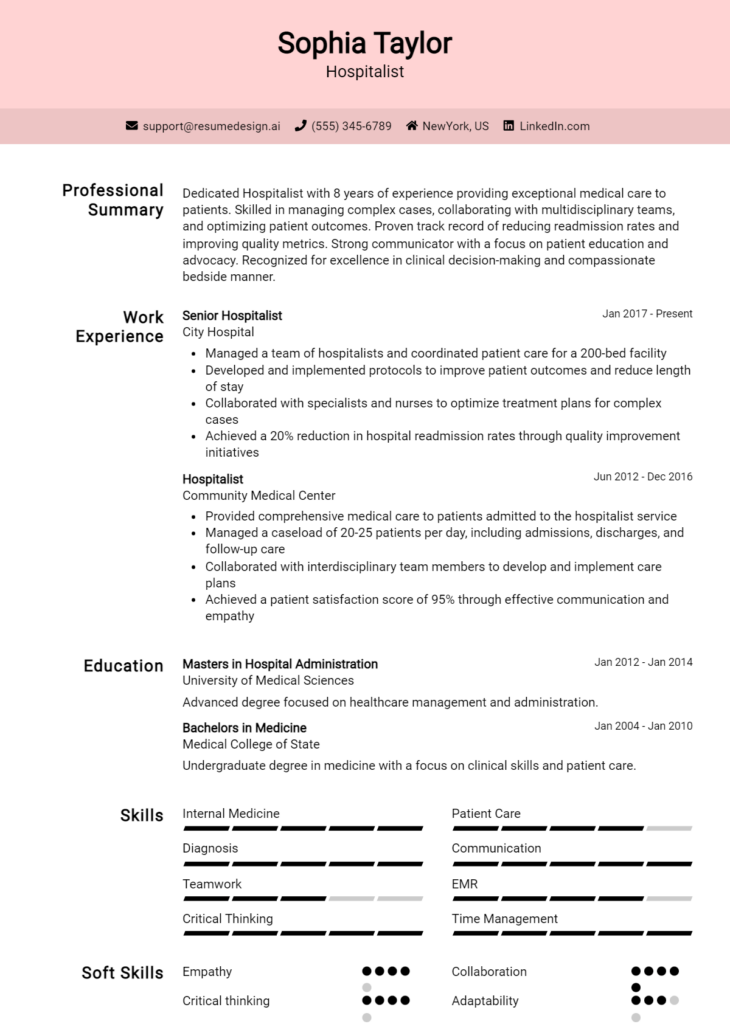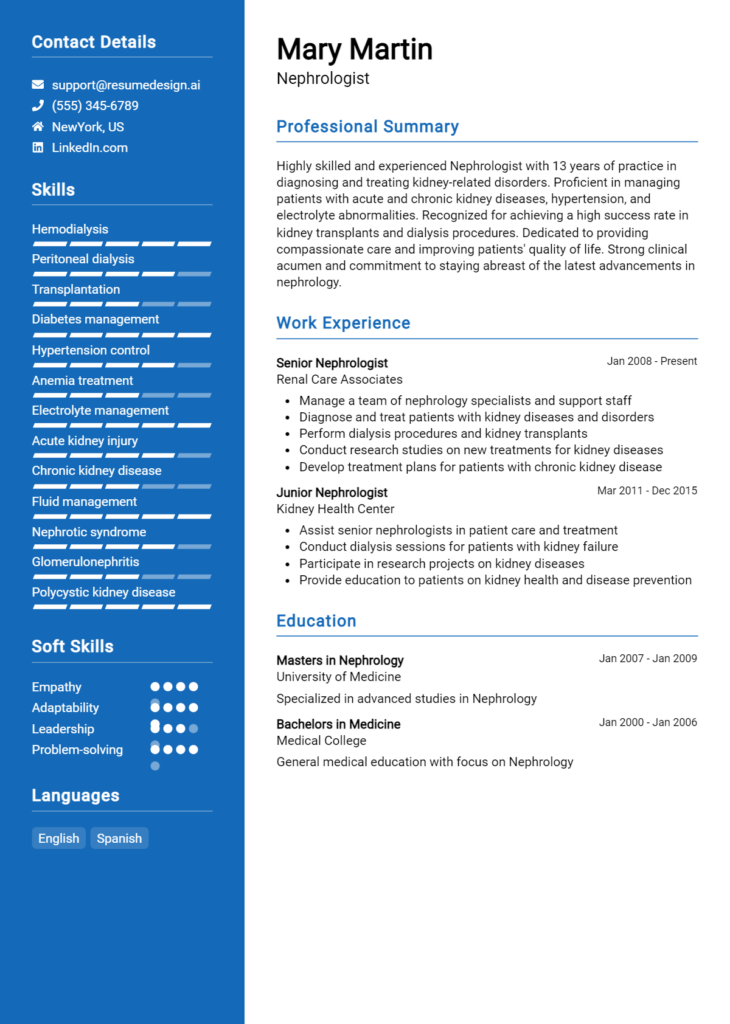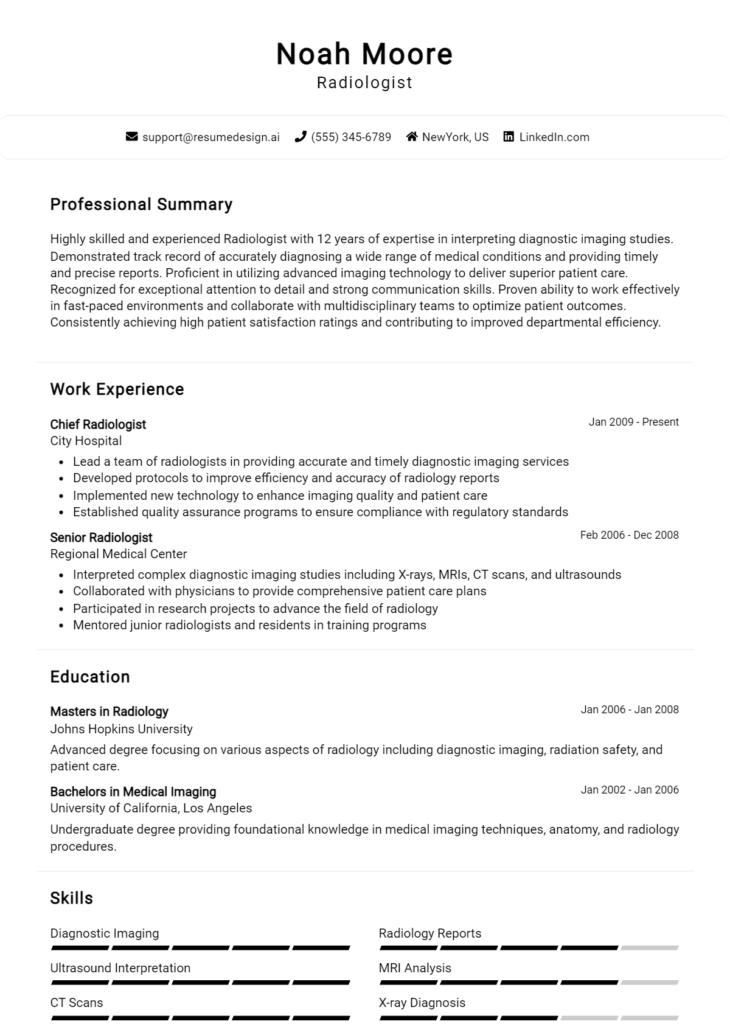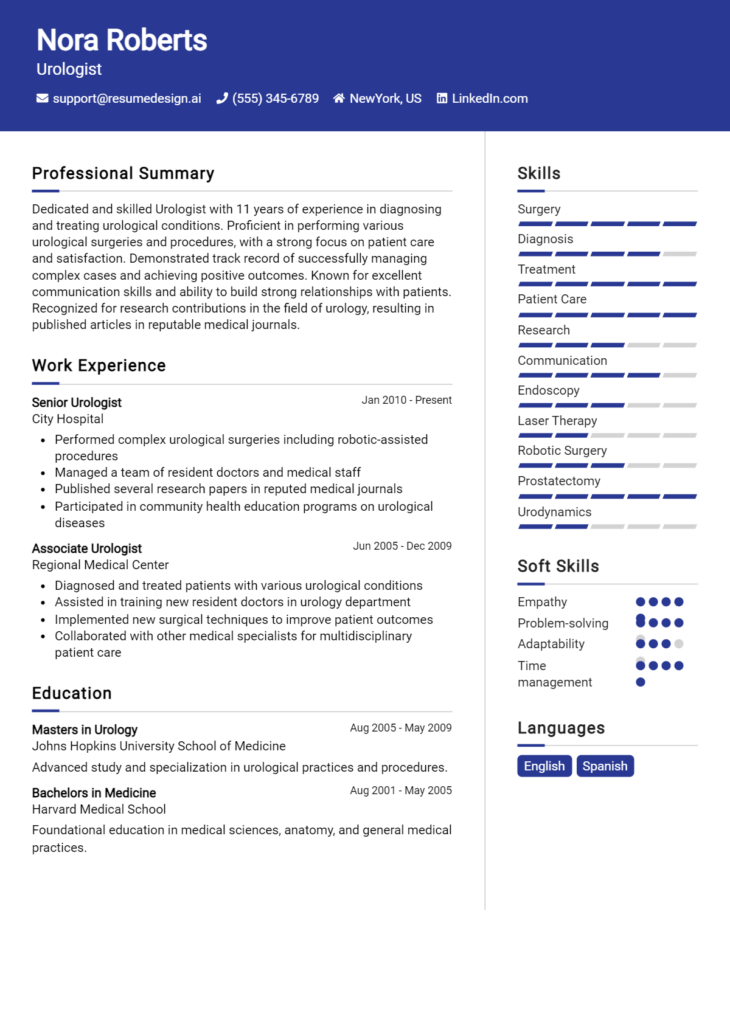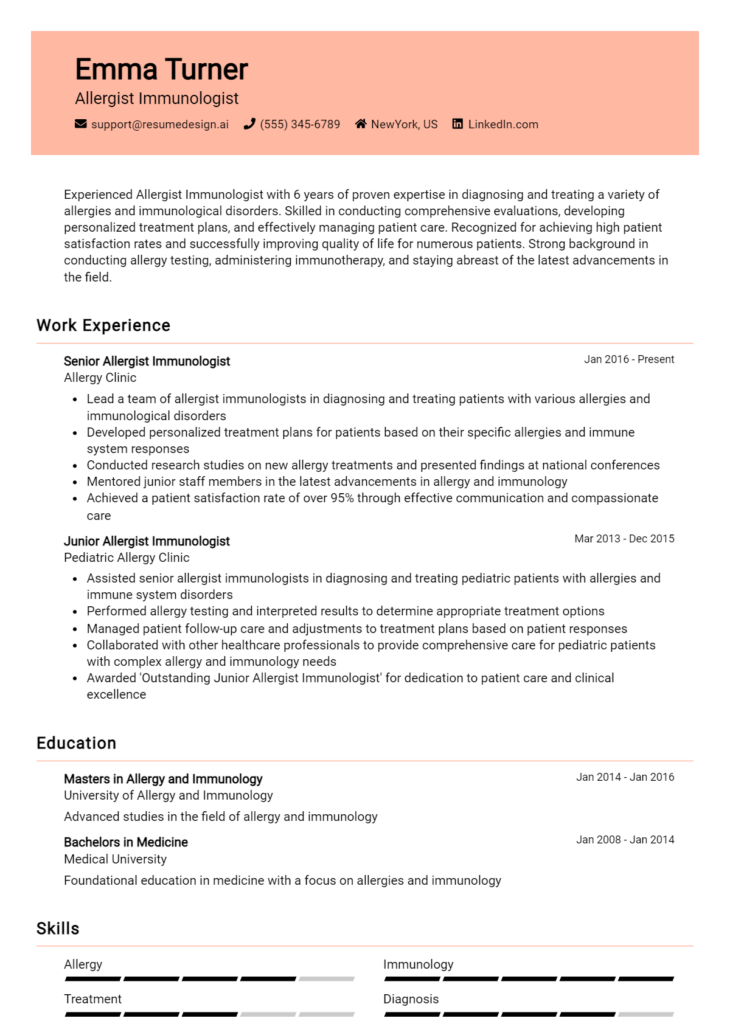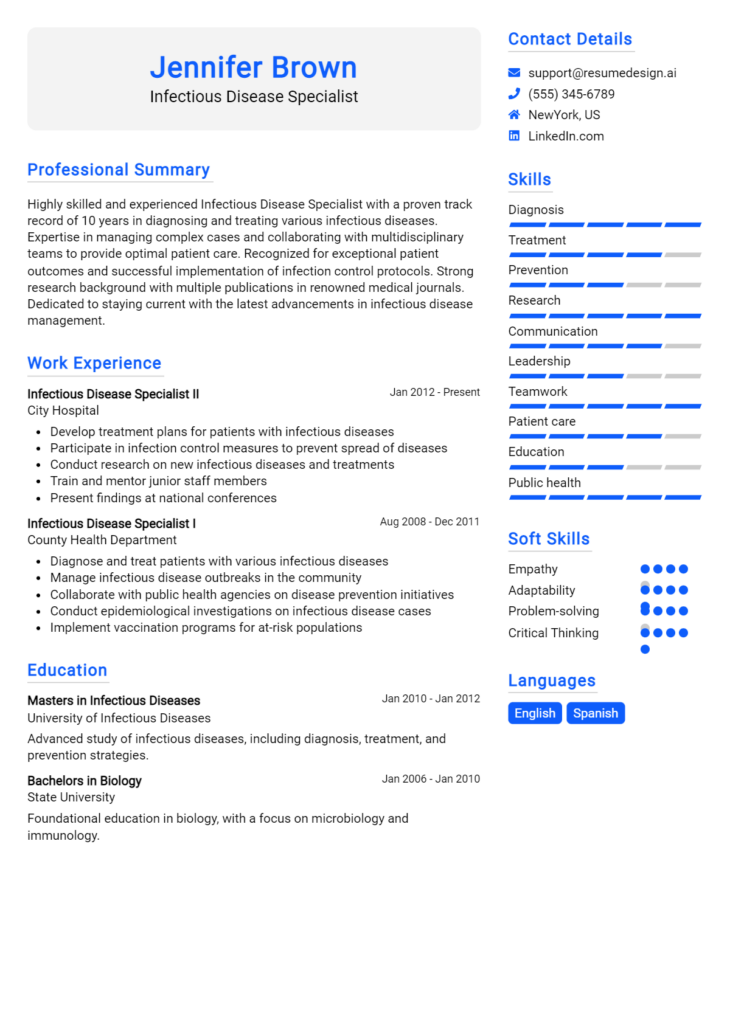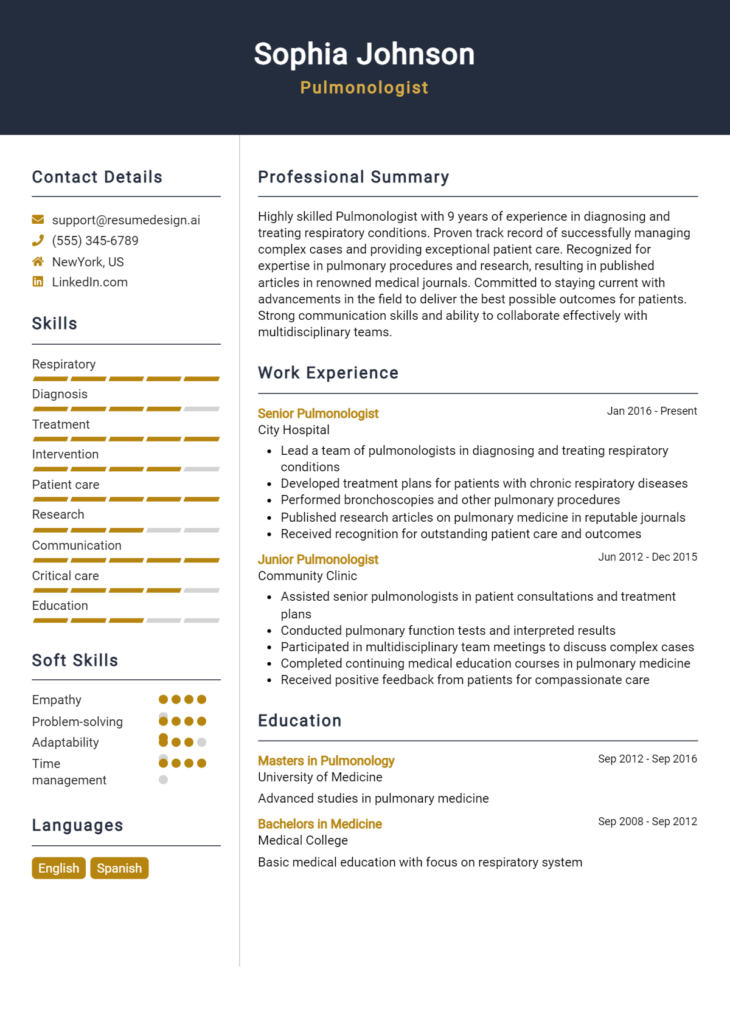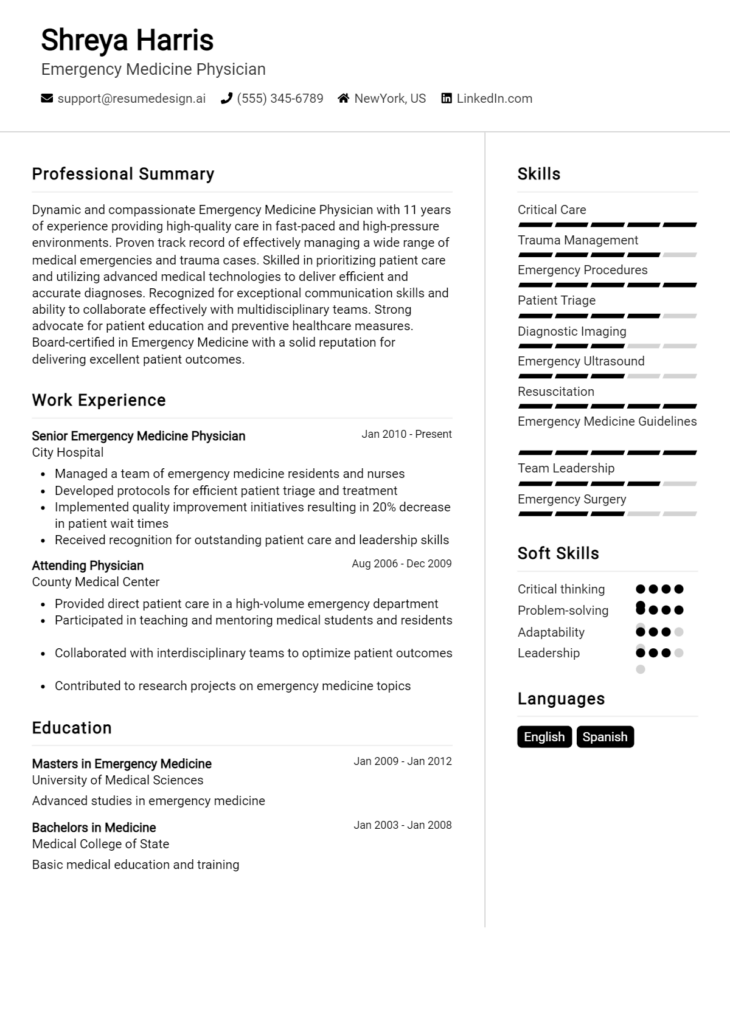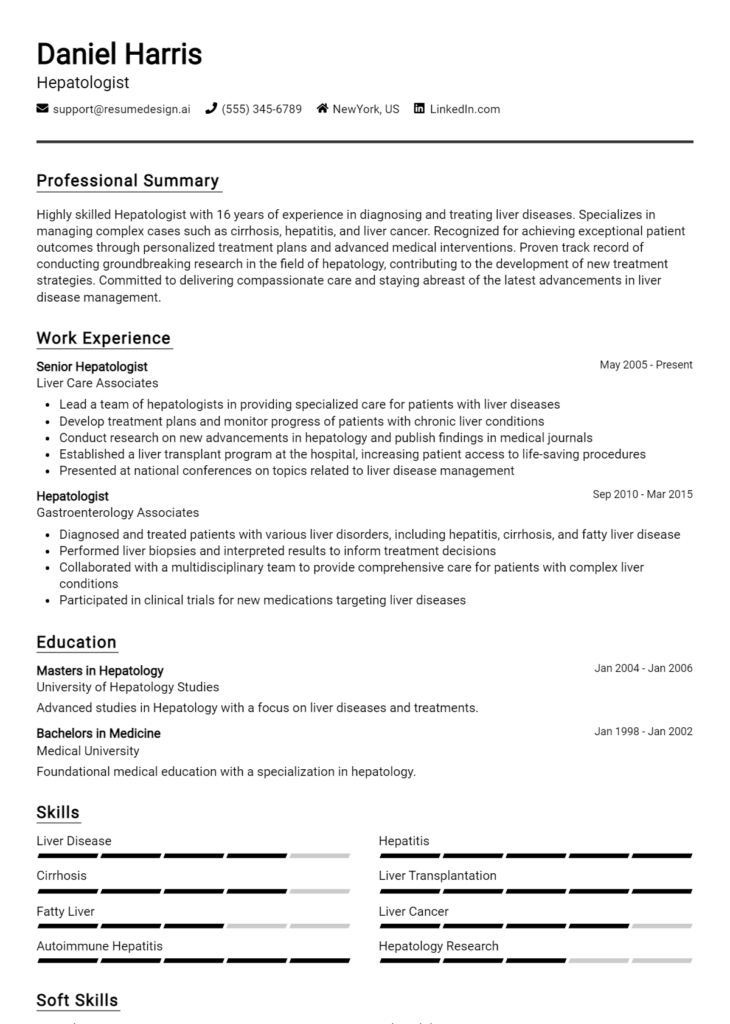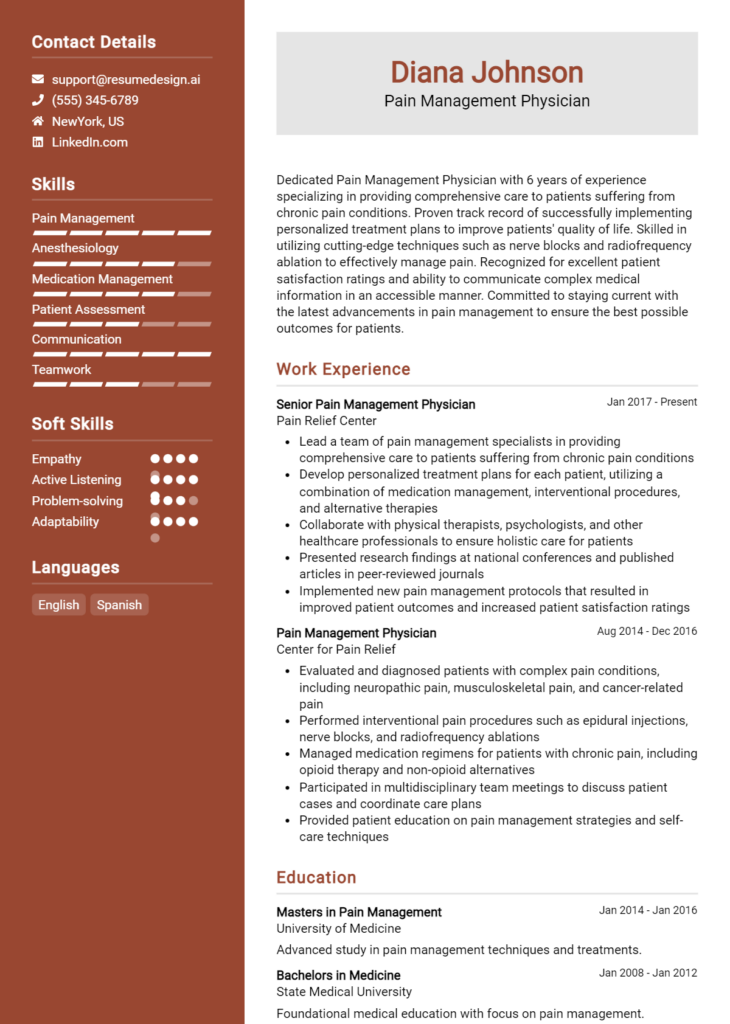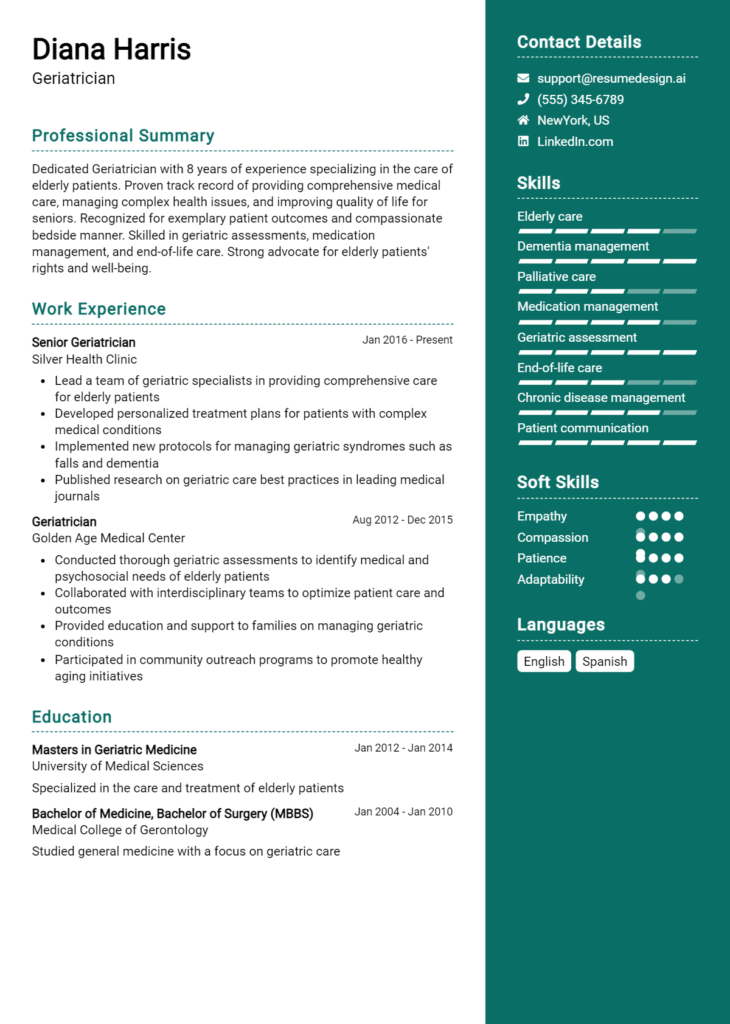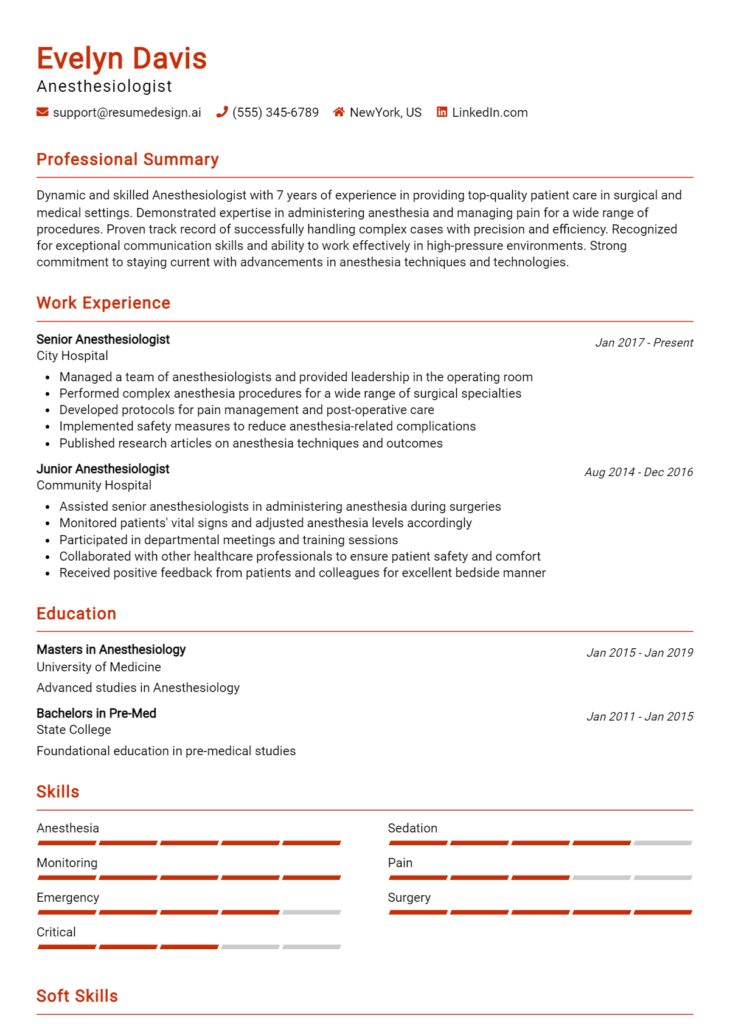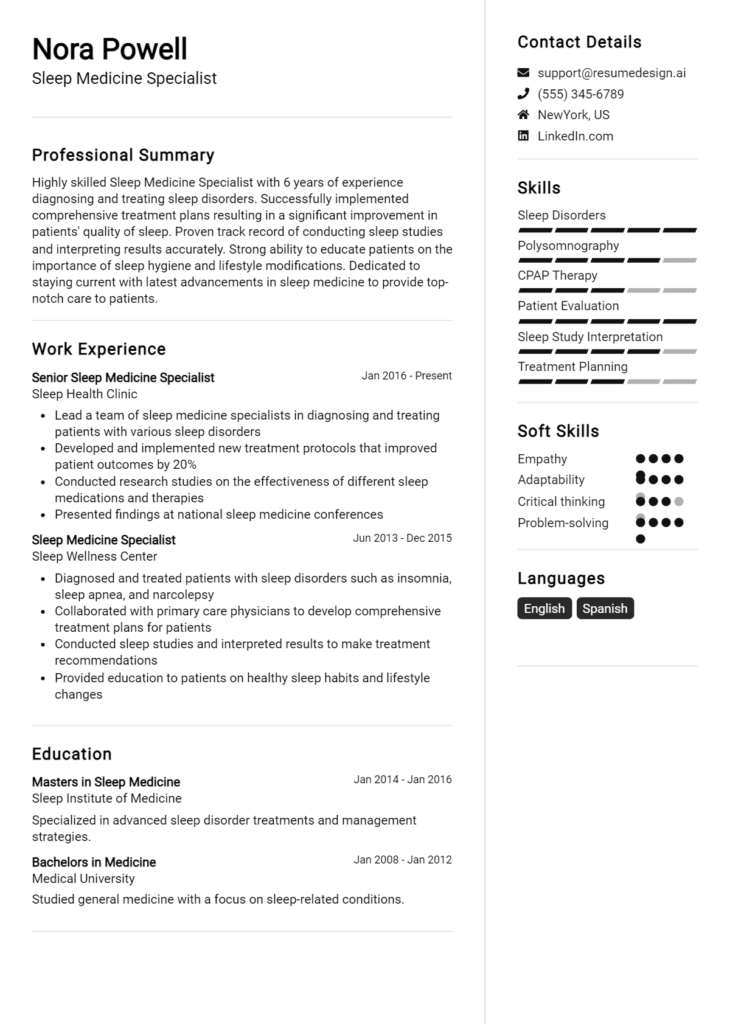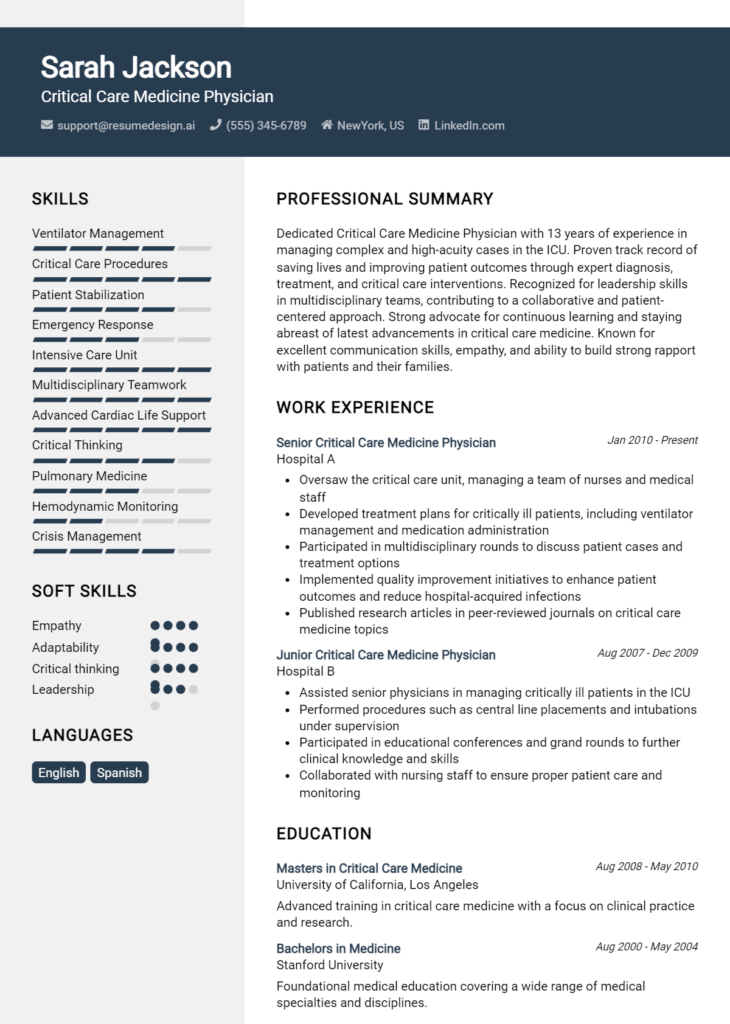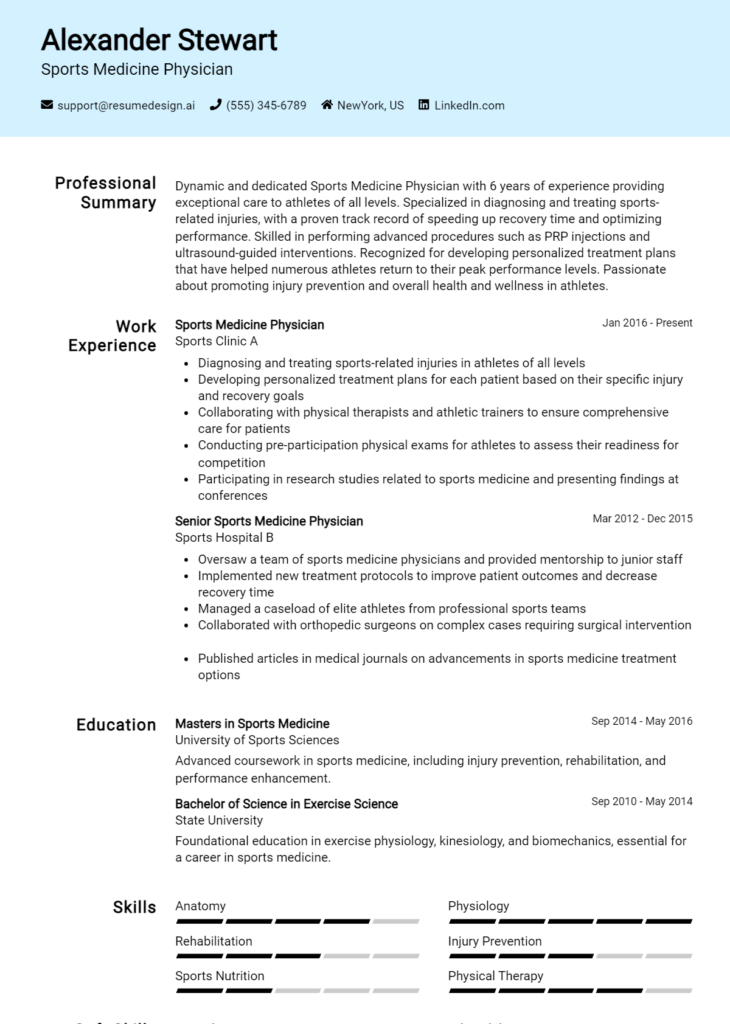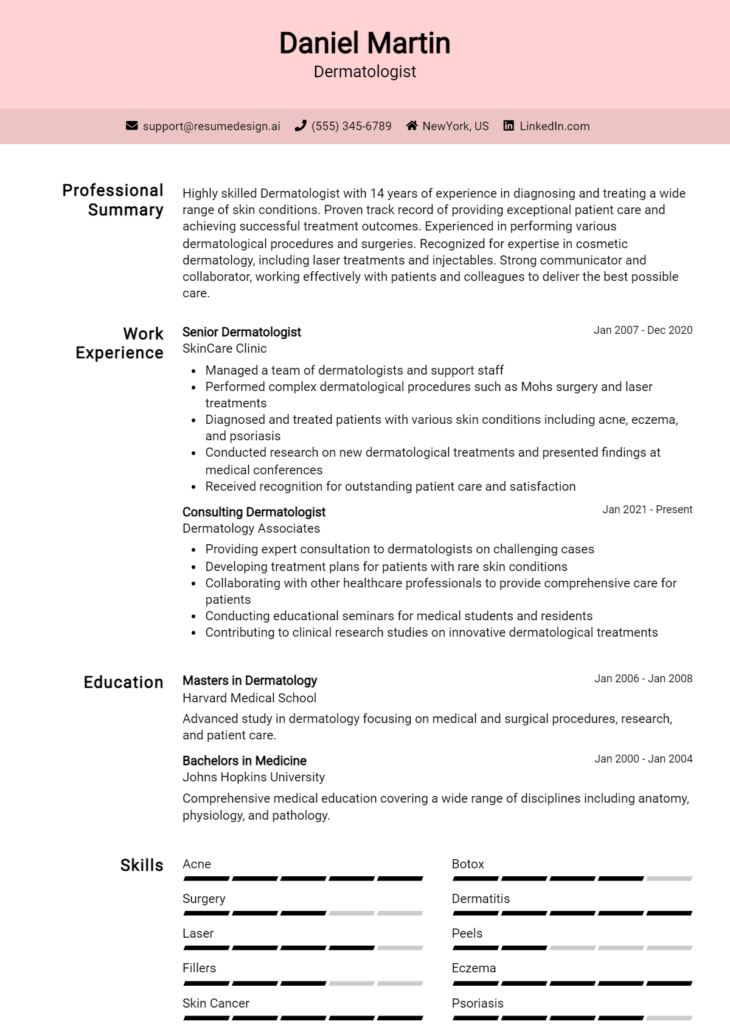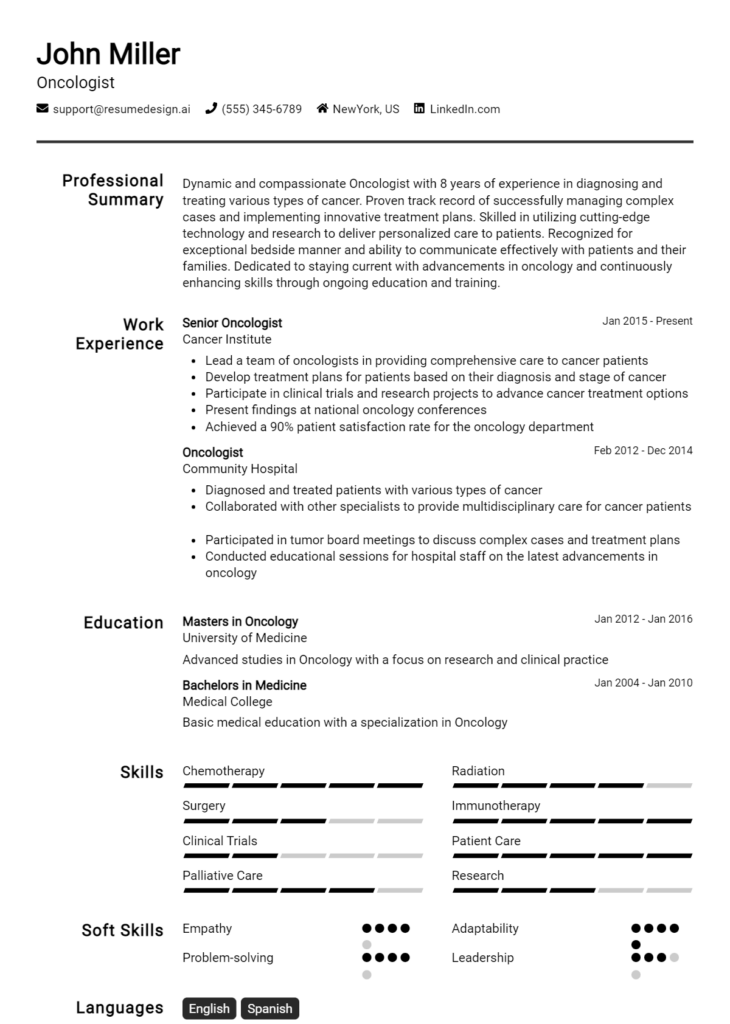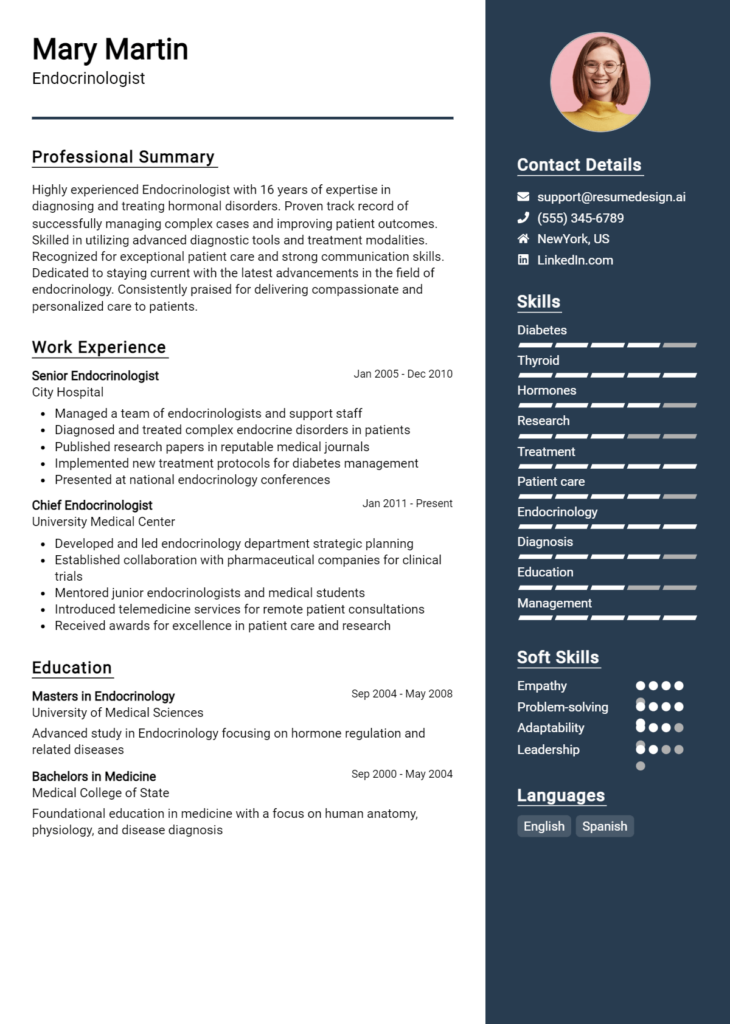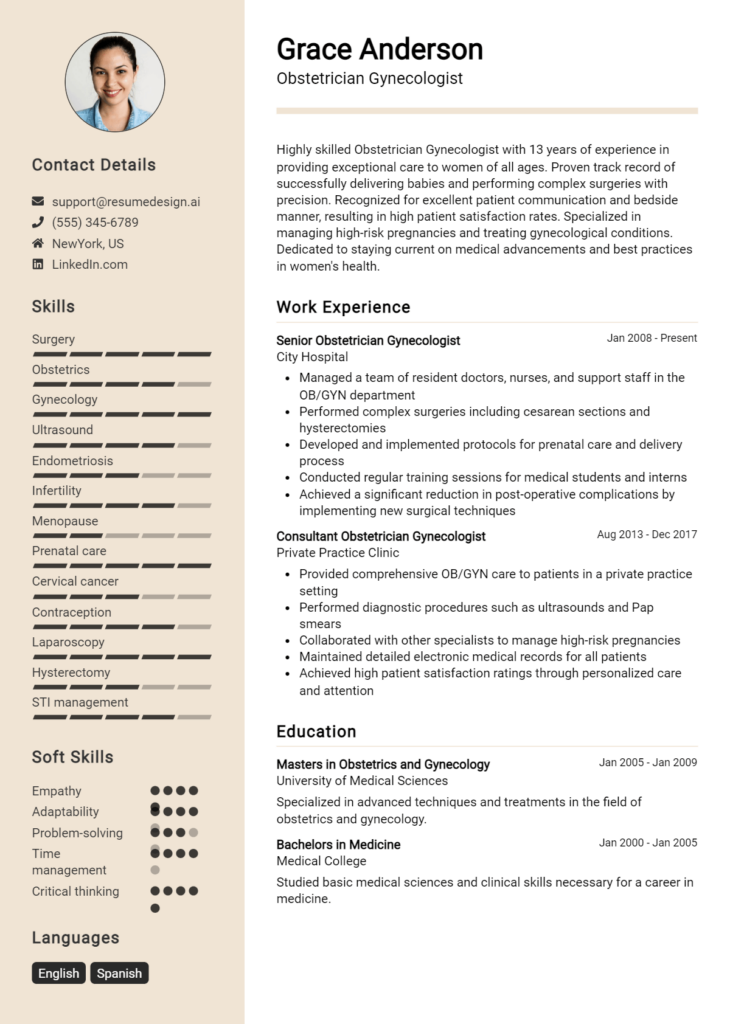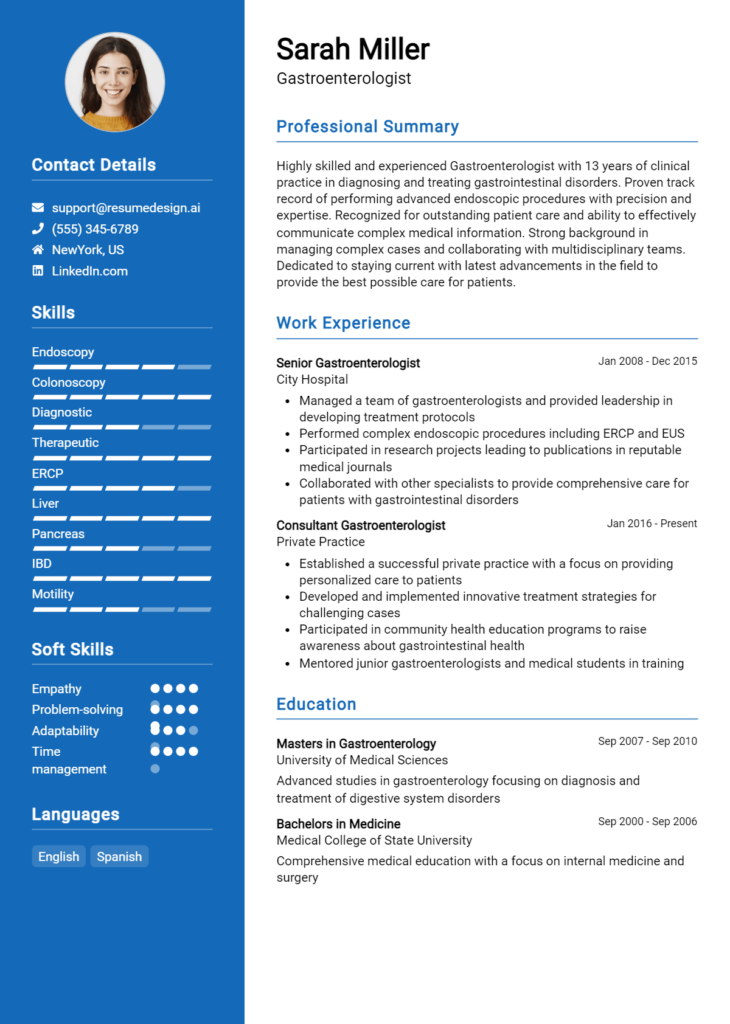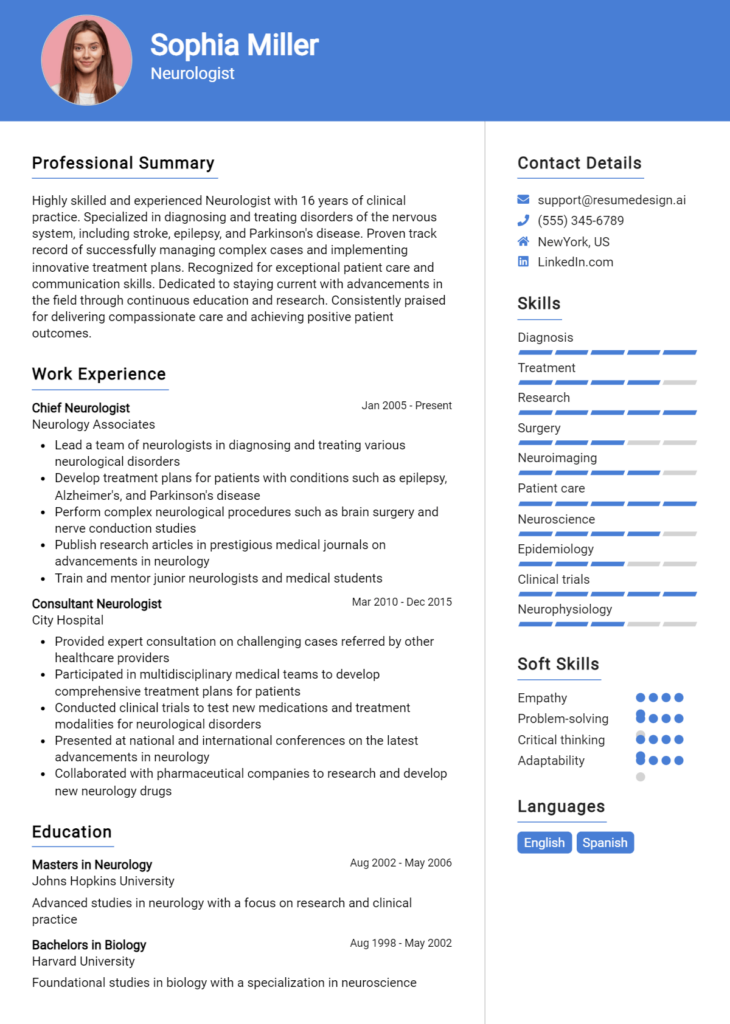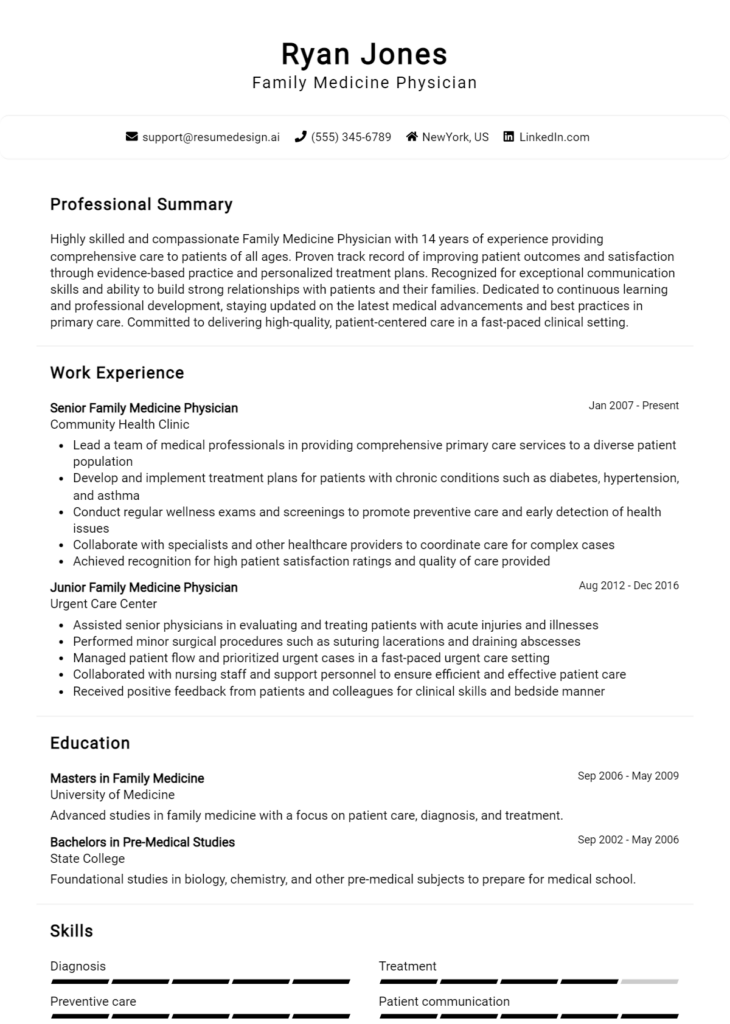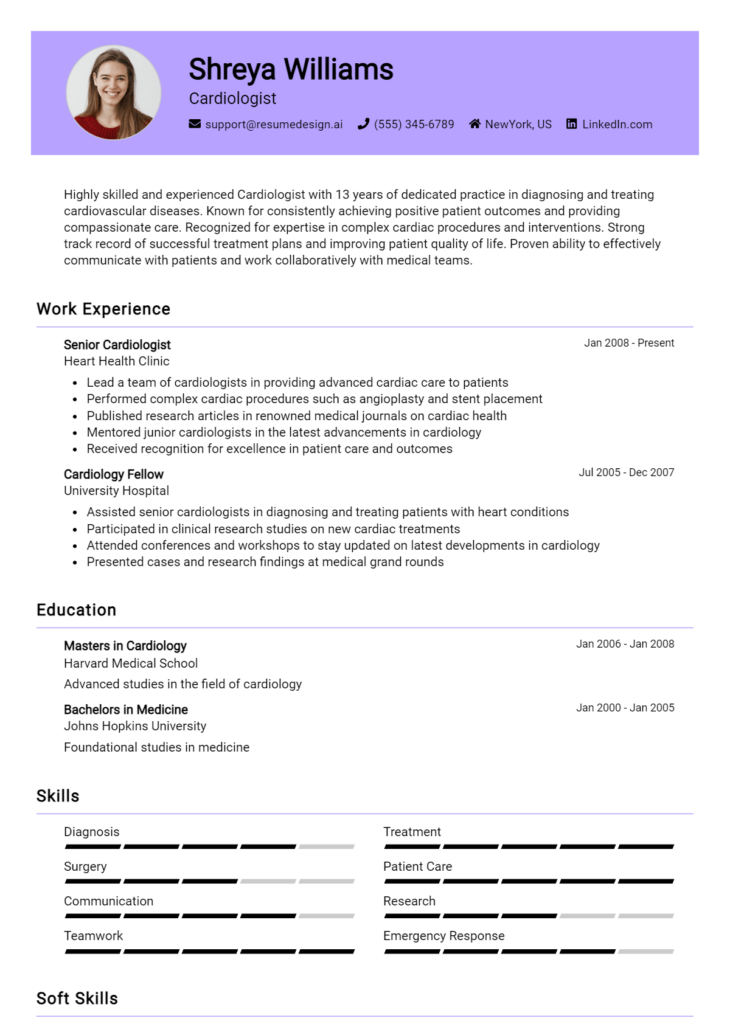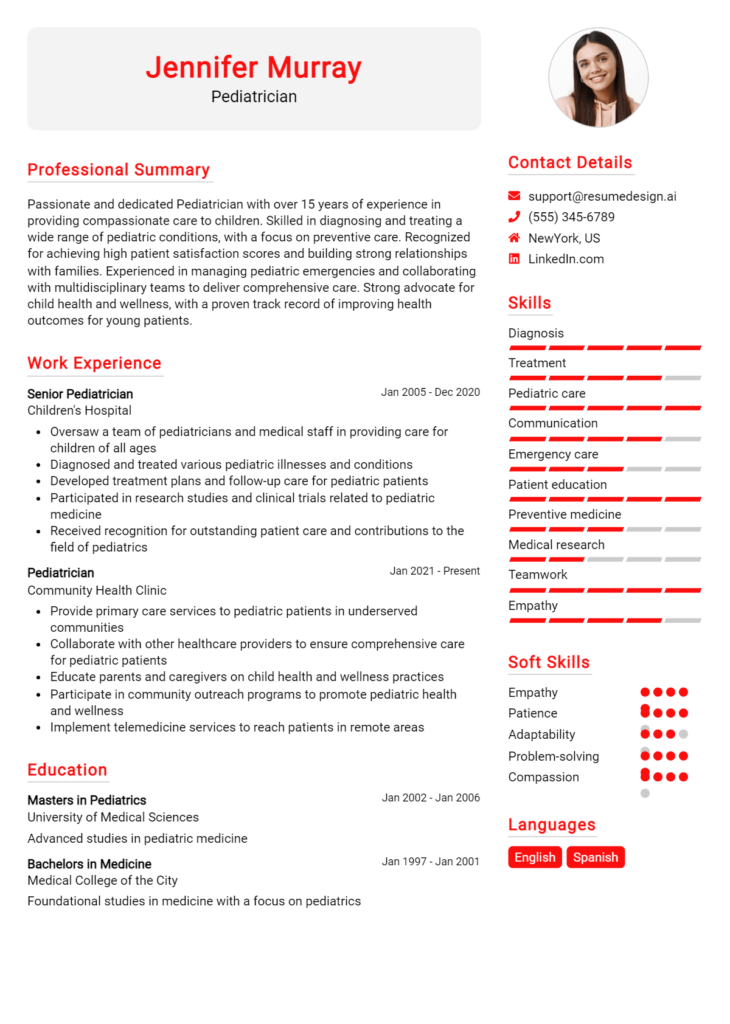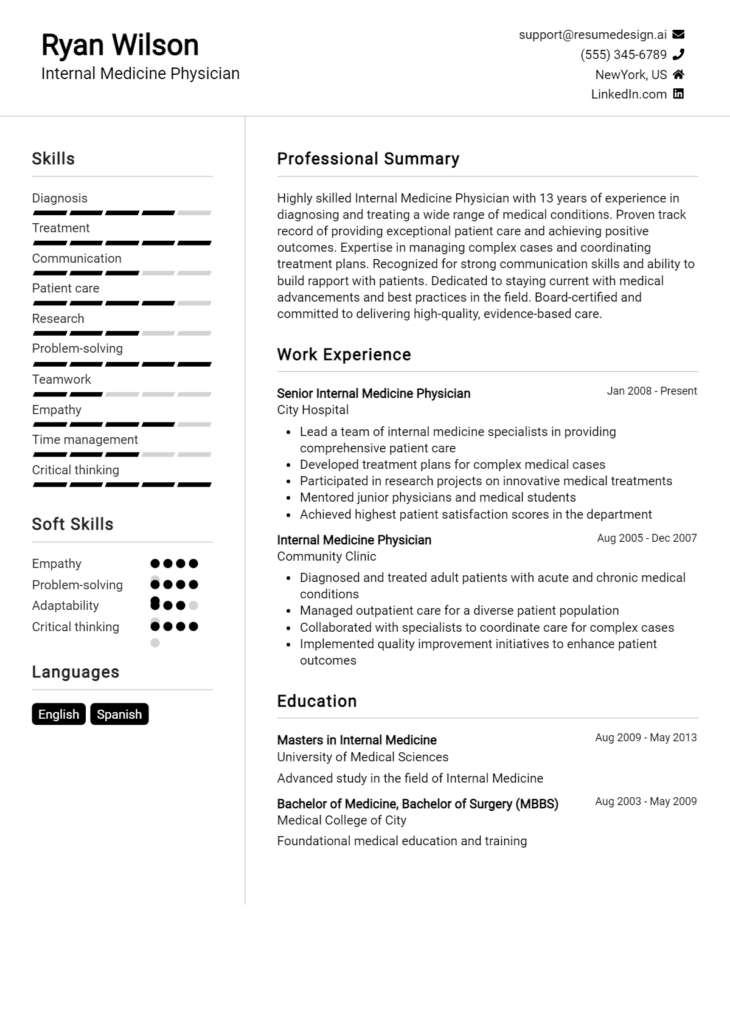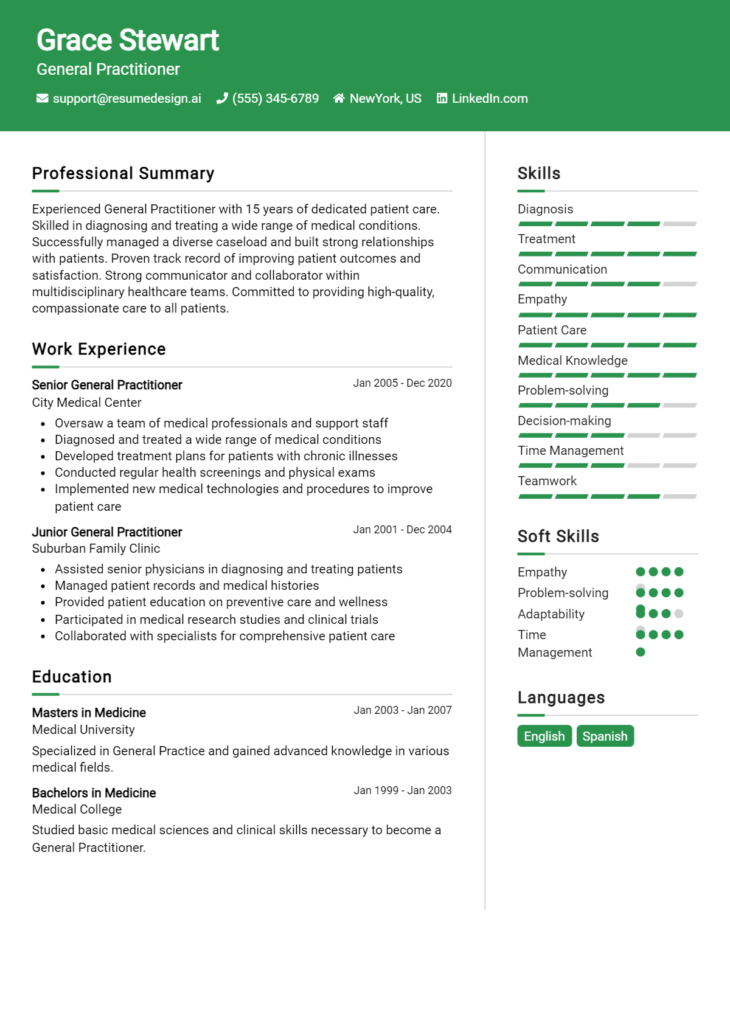Rheumatologist Core Responsibilities
A Rheumatologist plays a vital role in diagnosing and treating autoimmune diseases and musculoskeletal disorders. Key responsibilities include conducting patient assessments, developing treatment plans, and collaborating with other healthcare professionals to ensure comprehensive care. Strong technical skills in imaging and laboratory tests, operational abilities in managing patient flow, and problem-solving skills for complex conditions are essential. These competencies contribute to improved patient outcomes and organizational goals. A well-structured resume highlighting these qualifications can attract potential employers' attention.
Common Responsibilities Listed on Rheumatologist Resume
- Conduct comprehensive patient evaluations and physical examinations.
- Diagnose and manage conditions such as arthritis, lupus, and fibromyalgia.
- Develop individualized treatment plans and monitor patient progress.
- Perform joint injections and other therapeutic procedures.
- Collaborate with primary care physicians and specialists for coordinated care.
- Interpret laboratory tests and imaging studies relevant to rheumatology.
- Educate patients and families about disease management and treatment options.
- Stay updated on the latest research and advancements in rheumatology.
- Participate in clinical trials and contribute to research initiatives.
- Maintain accurate patient records and documentation.
- Provide mentorship and training to medical residents and fellows.
- Engage in community outreach to raise awareness about rheumatic diseases.
High-Level Resume Tips for Rheumatologist Professionals
In the competitive field of rheumatology, a well-crafted resume is essential for standing out to potential employers. Your resume is often the first impression you make, and it needs to effectively reflect your skills, achievements, and dedication to patient care. A compelling resume not only showcases your qualifications but also tells your professional story. This guide will provide practical and actionable resume tips specifically tailored for Rheumatologist professionals, helping you to create a document that captures the attention of hiring managers and sets you apart from other candidates.
Top Resume Tips for Rheumatologist Professionals
- Tailor your resume to the specific job description by highlighting relevant experience and skills that align with the requirements of the position.
- Use clear and concise language to describe your professional experience, focusing on the most impactful aspects of your previous roles.
- Quantify your achievements wherever possible, such as the number of patients treated, successful treatment outcomes, or improvements in patient satisfaction scores.
- Highlight industry-specific skills, including expertise in immunology, diagnostic techniques, and familiarity with current treatment protocols.
- Include relevant certifications and licenses, ensuring that they are up-to-date and reflect your commitment to ongoing professional development.
- Utilize active language and strong action verbs to convey your contributions and accomplishments effectively.
- Incorporate keywords from the job posting to improve your chances of passing through applicant tracking systems (ATS).
- Showcase any research, publications, or presentations that demonstrate your engagement with the rheumatology community and your commitment to advancing the field.
- Keep your resume organized and visually appealing, using clear headings and bullet points for easy readability.
- Proofread your resume multiple times to eliminate any errors in spelling, grammar, or formatting that could detract from your professionalism.
By implementing these tips, you can significantly increase your chances of landing a job in the rheumatology field. A well-structured and tailored resume not only showcases your qualifications but also demonstrates your attention to detail and commitment to your profession, making you a strong candidate for potential employers.
Why Resume Headlines & Titles are Important for Rheumatologist
In the competitive field of rheumatology, having a well-crafted resume headline or title is crucial for standing out to hiring managers. A strong headline serves as an immediate hook, summarizing a candidate's key qualifications in one impactful phrase. It not only grabs attention but also sets the tone for the rest of the resume, ensuring that essential skills and experiences are highlighted right from the start. An effective headline should be concise, relevant, and directly aligned with the job being applied for, making it easier for hiring professionals to recognize a candidate's potential fit for their team.
Best Practices for Crafting Resume Headlines for Rheumatologist
- Keep it concise—aim for one impactful phrase.
- Make it role-specific by including the title "Rheumatologist".
- Highlight key qualifications or certifications relevant to rheumatology.
- Use action-oriented language to convey confidence and expertise.
- Avoid jargon; ensure clarity for a wider audience.
- Incorporate metrics or achievements when possible.
- Reflect your unique value proposition as a rheumatologist.
- Tailor the headline to match the specific job description.
Example Resume Headlines for Rheumatologist
Strong Resume Headlines
Board-Certified Rheumatologist with 10+ Years of Clinical Experience and a Focus on Autoimmune Diseases
Dedicated Rheumatologist Specializing in Innovative Treatment Plans for Chronic Pain Management
Experienced Rheumatologist Committed to Patient-Centered Care and Advanced Research in Arthritis
Weak Resume Headlines
Rheumatologist Looking for a Job
Medical Professional with Experience in Various Fields
Strong resume headlines are effective because they communicate specific qualifications and strengths, allowing hiring managers to quickly gauge a candidate’s suitability for the position. They capture attention and clearly articulate what the candidate brings to the table. In contrast, weak headlines fail to make an impact due to their vagueness and lack of focus, leaving hiring managers unsure about the candidate’s relevance and capabilities. By avoiding generic phrases and honing in on specialized skills and experiences, candidates can significantly enhance their chances of making a memorable impression.
Writing an Exceptional Rheumatologist Resume Summary
A well-crafted resume summary is crucial for a Rheumatologist as it serves as the first impression to hiring managers. This brief yet powerful statement allows candidates to quickly showcase their key skills, relevant experience, and notable accomplishments in the field. A strong summary not only captures attention but also sets the tone for the rest of the resume, making it essential for candidates to be concise, impactful, and tailored to the specific job they are applying for. By highlighting pertinent qualifications, a compelling summary can significantly enhance a candidate's chances of securing an interview.
Best Practices for Writing a Rheumatologist Resume Summary
- Quantify Achievements: Use numbers and statistics to highlight your impact, such as patient outcomes or improvements in practice efficiency.
- Focus on Key Skills: Emphasize specific skills relevant to rheumatology, including diagnostic abilities, treatment planning, and patient management.
- Tailor to the Job Description: Customize your summary to align with the specific requirements and responsibilities mentioned in the job posting.
- Use Action Verbs: Start sentences with powerful action verbs that convey your contributions and accomplishments effectively.
- Keep it Concise: Aim for 2-4 sentences that convey your qualifications without overwhelming the reader.
- Highlight Specialty Areas: Mention any sub-specialties or particular areas of expertise that set you apart from other candidates.
- Include Soft Skills: Don’t forget to incorporate interpersonal skills, such as empathy and communication, that are vital in patient care.
- Showcase Continuous Learning: Indicate any ongoing education or certifications that demonstrate your commitment to the field.
Example Rheumatologist Resume Summaries
Strong Resume Summaries
Dedicated Rheumatologist with over 10 years of experience in diagnosing and treating autoimmune diseases. Successfully improved patient satisfaction scores by 30% through personalized care plans and effective communication.
Board-certified Rheumatologist adept at conducting comprehensive assessments and developing innovative treatment strategies. Recognized for achieving a 95% treatment success rate among patients with rheumatoid arthritis over the past five years.
Compassionate Rheumatologist with expertise in managing complex musculoskeletal disorders, resulting in a 40% reduction in patient hospitalizations through proactive care and education initiatives.
Weak Resume Summaries
Experienced doctor with a focus on rheumatology and patient care.
Rheumatologist looking for a new opportunity to help patients with joint issues.
The strong resume summaries stand out due to their specific achievements, quantifiable results, and direct relevance to the role of a Rheumatologist. They highlight key skills and demonstrate the candidate's impact in the field. In contrast, the weak summaries are vague and generic, lacking any measurable outcomes or unique qualifications that would capture the attention of hiring managers.
Work Experience Section for Rheumatologist Resume
The work experience section of a Rheumatologist's resume is critical for demonstrating the candidate's technical skills, leadership abilities, and commitment to delivering high-quality patient care. This section serves as a platform to highlight relevant clinical experiences, management of healthcare teams, and the implementation of effective treatment plans. By quantifying achievements and aligning their experiences with industry standards, rheumatologists can effectively showcase their contributions to patient outcomes and the healthcare community at large. A well-crafted work experience section not only reflects a candidate's qualifications but also their dedication to advancing the field of rheumatology.
Best Practices for Rheumatologist Work Experience
- Emphasize relevant clinical experiences and procedures performed.
- Quantify achievements with specific metrics, such as patient outcomes or improved treatment protocols.
- Highlight leadership roles in managing healthcare teams and interdisciplinary collaborations.
- Use industry-specific terminology to demonstrate familiarity with current practices and guidelines.
- Tailor the work experience to align with the job description and requirements.
- Include continuing education, certifications, or specialized training that enhance technical expertise.
- Showcase contributions to research, publications, or presentations at professional conferences.
- Utilize action verbs to convey a sense of initiative and impact in previous roles.
Example Work Experiences for Rheumatologist
Strong Experiences
- Led a team of five in the development of a new treatment protocol for rheumatoid arthritis, resulting in a 30% improvement in patient response rates over six months.
- Successfully managed a caseload of over 200 patients, consistently achieving a patient satisfaction score of 95% or higher.
- Collaborated with a multidisciplinary team to launch a community outreach program, increasing early diagnosis of lupus by 40% in underserved populations.
- Published research on the efficacy of biologic therapies in the Journal of Rheumatology, contributing to the advancement of treatment guidelines.
Weak Experiences
- Worked with patients in a clinical setting.
- Participated in various meetings and discussions.
- Helped with administrative tasks in the office.
- Assisted in patient care as needed.
The examples provided illustrate the distinction between strong and weak experiences in a Rheumatologist's resume. Strong experiences are characterized by specific, quantifiable achievements and demonstrate leadership, collaboration, and a direct impact on patient care and outcomes. In contrast, weak experiences lack detail and clarity, failing to convey the candidate's contributions or expertise, making them less compelling to prospective employers.
Education and Certifications Section for Rheumatologist Resume
The education and certifications section of a Rheumatologist resume is crucial as it showcases the candidate's academic credentials, specialized training, and commitment to continuous learning in the field of rheumatology. This section not only highlights the necessary qualifications for the role but also demonstrates the candidate's dedication to staying current with advancements in the industry. By including relevant coursework, recognized certifications, and any additional specialized training, candidates can significantly enhance their credibility and showcase their alignment with the demands of the job role, ultimately making a stronger impression on potential employers.
Best Practices for Rheumatologist Education and Certifications
- Prioritize relevant degrees, such as Doctor of Medicine (MD) or Doctor of Osteopathy (DO).
- Include board certifications, particularly from recognized bodies like the American Board of Internal Medicine.
- Highlight any fellowship training specifically in rheumatology.
- List continuing education courses that are pertinent to rheumatology and patient care.
- Provide details about any specialized workshops or training that enhance clinical skills.
- Be specific about the dates of completion for degrees and certifications to indicate currency.
- Use clear and concise formatting to improve readability and ensure key information stands out.
- Tailor the content to align closely with the job description, emphasizing applicable qualifications.
Example Education and Certifications for Rheumatologist
Strong Examples
- Doctor of Medicine (MD), Johns Hopkins University School of Medicine, 2015
- Board Certified in Rheumatology, American Board of Internal Medicine, 2018
- Completed Fellowship in Rheumatology, Mayo Clinic, 2017
- Continuing Education in Advanced Musculoskeletal Ultrasound, 2022
Weak Examples
- Bachelor of Arts in English Literature, University of XYZ, 2010
- Certification in Basic Life Support (BLS), expired 2019
- Coursework in General Chemistry, 2012
- Non-specialized training in nutrition, 2020
The strong examples are considered relevant as they directly align with the qualifications needed for a Rheumatologist, showcasing advanced degrees, recognized certifications, and specialized training that enhance the candidate's expertise. In contrast, the weak examples reflect outdated or irrelevant qualifications that do not contribute to the candidate's suitability for the role, such as unrelated degrees or expired certifications, which could detract from their professional appeal.
Top Skills & Keywords for Rheumatologist Resume
In the highly specialized field of rheumatology, a well-crafted resume is essential for demonstrating not only your medical expertise but also the diverse skill set necessary for patient care and collaboration with other healthcare professionals. Skills play a pivotal role in distinguishing a rheumatologist in a competitive job market, as they reflect both clinical competence and interpersonal abilities. A strong resume will highlight these skills, showcasing your proficiency in diagnosing and treating rheumatic diseases, as well as your capacity to communicate effectively with patients and colleagues. By emphasizing both hard and soft skills, you can create a compelling narrative of your qualifications that aligns with the expectations of potential employers.
Top Hard & Soft Skills for Rheumatologist
Soft Skills
- Empathy and Compassion
- Strong Communication Skills
- Active Listening
- Team Collaboration
- Problem-Solving Abilities
- Time Management
- Adaptability
- Critical Thinking
- Patient Education
- Conflict Resolution
Hard Skills
- Proficient in Musculoskeletal Examination
- Knowledge of Rheumatologic Diseases
- Experience with Diagnostic Imaging Techniques
- Competence in Joint Injections and Aspiration
- Familiarity with Laboratory Tests and Interpretation
- Understanding of Pharmacological Treatments
- Ability to Develop Treatment Plans
- Expertise in Patient Management Systems
- Research and Clinical Trial Knowledge
- Regulatory Compliance and Documentation
For more details on essential skills and how to effectively present your work experience in a rheumatologist resume, consider exploring additional resources to enhance your application.
Stand Out with a Winning Rheumatologist Cover Letter
I am writing to express my interest in the Rheumatologist position at [Hospital/Clinic Name], as advertised on [Job Board/Company Website]. With my extensive training in internal medicine and a specialized fellowship in rheumatology, I am eager to contribute my expertise in diagnosing and managing autoimmune and inflammatory diseases. My experience in both outpatient and inpatient settings has equipped me with a comprehensive understanding of patient care, and I am excited about the opportunity to provide high-quality health services to your diverse patient population.
During my fellowship at [Fellowship Institution], I honed my skills in evaluating complex cases and developing tailored treatment plans for various rheumatic conditions, including rheumatoid arthritis, lupus, and psoriatic arthritis. I successfully collaborated with multidisciplinary teams to ensure holistic patient management, emphasizing the importance of communication and empathy in building trust with patients. My research on novel therapeutic approaches has not only enriched my clinical practice but also deepened my commitment to advancing the field of rheumatology through evidence-based medicine.
I am particularly drawn to [Hospital/Clinic Name] due to its reputation for excellence in patient-centered care and its commitment to innovative research. I believe that my proactive approach and dedication to continuous learning align well with your organization’s values. I am excited about the possibility of working alongside esteemed colleagues who are equally passionate about improving the lives of patients affected by rheumatic diseases. Thank you for considering my application; I look forward to the opportunity to discuss how my background, skills, and enthusiasms can contribute to your team.
Common Mistakes to Avoid in a Rheumatologist Resume
When crafting a resume for a rheumatologist position, it's essential to present a polished and professional image that highlights your skills and experiences effectively. However, many candidates make common mistakes that can undermine their chances of landing an interview. Being aware of these pitfalls can help you create a standout resume that accurately reflects your qualifications and readiness for the role. Below are some frequent errors to avoid:
Using a Generic Template: Relying on a one-size-fits-all template can make your resume appear impersonal and unoriginal. Tailor your layout and content to reflect your unique experiences in rheumatology.
Neglecting Relevant Experience: Failing to emphasize relevant clinical experience, such as fellowships or specialized training, can lead to missed opportunities. Be sure to highlight your hands-on experience with various rheumatological conditions and treatments.
Overloading with Medical Jargon: While it’s important to demonstrate your medical knowledge, excessive jargon can alienate non-medical readers, such as HR personnel. Use clear language and explanations that can be understood by a broader audience.
Not Showcasing Soft Skills: Rheumatology often involves patient interaction and interdisciplinary collaboration. Omitting soft skills like communication, empathy, and teamwork can make your resume less appealing to potential employers.
Ignoring Research Contributions: If you have participated in research or published articles, failing to include these achievements can be a significant oversight. Highlighting your contributions can demonstrate your commitment to advancing the field.
Lacking Specificity: Being vague about your accomplishments can weaken your resume. Use quantifiable metrics and specific examples to showcase your impact in previous roles, such as patient outcomes or successful treatment plans.
Inconsistent Formatting: A disorganized or inconsistent format can distract from your qualifications. Ensure your resume is visually appealing and easy to read, with uniform fonts, bullet points, and spacing.
Forgetting to Proofread: Spelling and grammatical errors can create a negative impression. Always proofread your resume and consider having a colleague review it to catch any mistakes you might have missed.
Conclusion
As a Rheumatologist, your expertise in diagnosing and treating autoimmune diseases and musculoskeletal disorders is crucial for improving patients' quality of life. In this article, we explored the essential skills and qualifications needed for this role, including a strong foundation in internal medicine, excellent communication skills, and the ability to work collaboratively with other healthcare professionals. We also discussed the importance of staying updated with the latest research and treatment modalities to provide the best care to your patients.
Now, as you reflect on your career and consider new opportunities, it's the perfect time to review your Rheumatologist resume. A well-crafted resume can make a significant difference in showcasing your skills and experiences to potential employers. To assist you in this process, take advantage of the resources available to you:
- Explore a variety of resume templates that can help you structure your resume effectively.
- Use the resume builder to create a personalized and professional-looking resume with ease.
- Check out resume examples to gain insights into how other successful Rheumatologists present their qualifications.
- Don’t overlook the importance of a strong introduction; utilize cover letter templates to complement your resume and make a lasting impression.
Take the next step in your career by refining your resume today. Your expertise deserves to be highlighted, and with the right tools, you can make a compelling case for your next position in the field of rheumatology.

